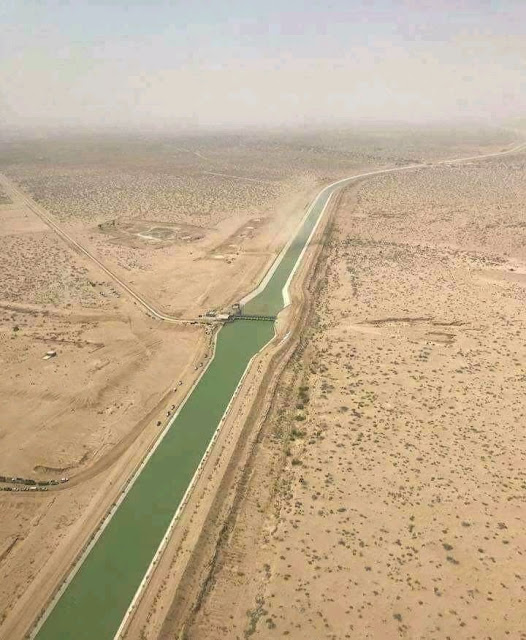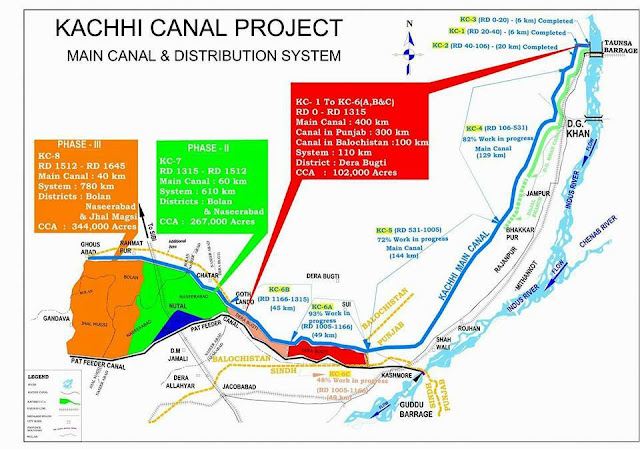PakAlumni Worldwide: The Global Social Network
The Global Social Network
Kachhi Canal and N-70 Highway Projects to Boost Pakistan's Balochistan
East-West infrastructure projects in Pakistan pose unique challenges. Sending hundreds of cusecs of water up more than a mile from the River Indus to Balochistan via Kachhi canal is one of these challenges. Another challenge is to improve and expand national east-west highways like N-70. These recently completed infrastructure projects linking South Punjab with Balochistan will boost agriculture and transportation sectors and bring economic benefits to Pakistanis living in the country's least developed areas.
Kachhi Canal Project:
Recently completed 400 kilometers in phase 1 of 500 kilometer long Kachhi Canal is now the longest irrigation canal in Pakistan. It stretches from the plains of South Punjab to the heights of eastern Balochistan where it will eventually irrigate over 700,000 acres of arid land, according to WAPDA (Water and Power Development Authority).
Kachhi Canal Pakistan |
Part of Kachhi canal is made up of 56 inch diameter pipeline that will pump 120 cusecs (cubic feet per sec) of Indus water 7,000 feet above sea level across Sulaiman mountain range. This feat of engineering made possible by NESPAK (National Engineering Services of Pakistan), a consulting firm that I worked for 3 years in mid-1970s.
Kachhi Canal Project Phases |
National Highway N-70:
National highway N-70 runs from Multan in Punjab to the town of Qilla Saifullah via Dera Ghazi Khan, and Loralai in Balochistan province. It requires traversing 11,500 feet high Sulaiman mountains, the southern extension of Hindu Kush mountain range. It has recently been completed.
N-70 Highway Pakistan |
The condition of old British colonial era N-70 national highway was very poor. In particular, the hilly sections of the road suffered from frequent rock falls and debris and occasional land slides from the steep mountain side. It had narrow road width, coupled with hair-pin bends and relatively steep slope. Trucks pulling containers were forced to take alternative route via N-65 highway to Quetta. The solution was to use seven steel bridges that were 11.5 kilometers in length. The project was completed at a cost of $142 million with the assistance of JICA, Japan's international aid agency.
| Steel Bridges At Fort Monroe on N70 Highway |
Summary:
Recently completed infrastructure projects linking South Punjab with Balochistan will boost agriculture and transportation sectors and the economy in Pakistan's least developed areas. Kachhi canal will irrigate hundreds of thousands of acres of arid land while improvement and widening of N-70 east-west national highway will help movement of goods and people to integrate remote areas with the national economy.
Related Links:
-
Comment by Riaz Haq on February 1, 2025 at 9:16am
-
Pakistan’s Cholistan Canal: Myths And Realities – OpEd – Eurasia Review
https://www.eurasiareview.com/22112024-pakistans-cholistan-canal-my...
The construction of the Cholistan Canal has been falsely portrayed as a threat to inter-provincial harmony, particularly between Punjab and Sindh. These narratives, however, are far from the truth. They serve not the people but those who seek to destabilize Pakistan, exploiting regional tensions for political gain. To counter this, we must demystify the project and understand its transformative potential. Pakistan’s agricultural imports have ballooned to $10 billion annually, even as we possess the capacity to meet domestic demands. For instance, the country faces a 4-million-metric-ton wheat shortfall despite being the world’s eighth-largest wheat producer. The Cholistan Canal, part of the broader Green Pakistan Initiative, is pivotal in closing this gap. By irrigating previously barren lands in the Cholistan Desert, it promises to revitalize agriculture and boost food security.
The canal’s first phase, extending 176 kilometers from the Sulemanki Barrage on the Sutlej River to Fort Abbas, will irrigate 452,000 acres of desert land. The second phase will further extend irrigation to 744,000 acres, bringing the total to over 1.2 million acres of newly cultivated land. This initiative is not just about agriculture; it is about economic empowerment. The project will generate thousands of jobs, support kharif crops like cotton, and contribute an estimated $3.79 billion annually to Pakistan’s economy through cotton production alone.
Critics claim that the canal will deprive Sindh of its fair share of water, disrupt ecosystems, and jeopardize inter-provincial agreements. These assertions are misleading. Punjab’s use of 0.58 million acre-feet (MAF) of water for the Cholistan Canal is well within its allocated share under the 1991 Water Apportionment Accord (WAA). This share represents a mere 2% of the 30 MAF of water that currently flows unused into the sea.
Furthermore, the project aligns with the WAA’s principle of provincial autonomy, allowing provinces to develop infrastructure within their allocations. The Indus River System Authority (IRSA), Pakistan’s constitutional water regulator, has already issued a No Objection Certificate (NOC) for the canal, ensuring its compliance with federal water-sharing agreements.
-
Comment by Riaz Haq on February 21, 2025 at 10:48am
-
Reko Diq Mining Company hosts open public forum in Nokkundi
https://www.app.com.pk/domestic/reko-diq-mining-company-hosts-open-...
QUETTA, Feb 21 (APP):Reko Diq Mining Company (RDMC) held an open public forum in Nokkundi held at RDMC Technical Institute, organized by The Hunar Foundation.
The event saw active participation from a diverse group of local stake holders including youth from Nokkundi. Notable attendees included Haji Amanullah Kubdani, Maula Bakhsh Alezai of the National Party, Wahid Bakhsh Sherzai, Nizam Lashari, Babu Razzaq Sasoli, and Muhammad Anwar from the BNP.
During the forum, RDMC’s team provided attendees with important updates and insights on various community development initiatives, with a particular focus on the skills development program run in collaboration with The Hunar Foundation and the Mother & Child Health Center managed by the Indus Hospital Network.
RDMC’s Community Engagement Manager Ali Dost Yallanzai, Community Investment Lead Essa Tahir Sanjrani, HR Lead Inayat Kubdani, and Community Engagement Lead Noor Khan Mengal addressed a range of queries from community members.
A question regarding the publication of employee lists was addressed by explaining that, in line with international HR best practices, RDMC is committed to protecting employees’ privacy and safety and, as such, cannot disclose personal information about specific employees publicly.
Regarding local hiring, it was highlighted that as of January 2025, 78 percent of RDMC’s workforce is from Balochistan, with over 50 percent from Chagai, the majority of whom are from Nokkundi.
The forum also featured presentations from Qazi Taimoor Sanjrani, Program Manager at The Hunar Foundation, and Sher Jan Baloch, Operations Manager at Indus Hospital. These presentations highlighted the significant contributions made by both organizations, particularly regarding their local workforce.
The community was informed that, as RDMC partners, both The Hunar Foundation and Indus Hospital prioritize local hiring. Over 95 percent of their employees are from Balochistan, with the majority coming from Chagai district.
The community expressed their gratitude and appreciation for RDMC’s commitment to transparency and engagement through the organization of this open forum.
-
Comment by Riaz Haq on Thursday
-
Why is Pakistan’s new canal project sparking water shortage fears? | Water News | Al Jazeera
https://www.aljazeera.com/news/2025/3/27/why-is-pakistans-new-canal...
Islamabad, Pakistan – The Pakistan government has launched an ambitious agricultural project with the aim of boosting food security in the South Asian nation of 240 million people.
A network of six canals will be built across the country to irrigate millions of acres of barren lands as part of the $3.3bn (945 billion rupees) project called Green Pakistan Initiative (GPI), which was launched by the country’s powerful army chief General Asim Munir and Prime Minister Shehbaz Sharif in 2023.
---
But critics say the megaproject, which aims to build canals across Pakistan’s four provinces, would cause water shortages in the southern parts of the country. They say the project was planned without consent from stakeholders.
------------------
What is the Green Pakistan Initiative?
Agriculture is the backbone of Pakistan’s economy, contributing nearly 25 percent of its gross domestic product (GDP) and providing 37 percent of its employment.
The GPI was launched in July 2023 to address outdated farming practices to improve productivity.
It aims to modernise the agricultural sector by introducing new technologies and equipment, including drones, land management systems, and tractors, as well as providing seeds and fertilisers to increase yields.
The project also aims to provide technical inputs to farmers, including soil testing among other services, and attract both domestic and foreign investment to create what Munir described as “modern farms” at the project’s inauguration in Islamabad in 2023.
Pakistan imported $9bn worth of food items in 2023, even as it has faced a balance of payment crisis and has been forced to borrow funds from the International Monetary Fund (IMF).
The Green Corporate Initiative (GCI), an army-owned private company, has been tasked with converting wastelands into cultivable farmland.
“Revitalising agriculture is essential for the economy, particularly as Pakistan faces climate-related threats,” retired army general Shahid Nazir, who heads the GPI, told Al Jazeera.
Nazir said 4.8 million acres (1.94 million hectares) of “barren wasteland” has been identified across the country.
Making that land cultivable would also provide employment opportunities to more than 60,000 people, he added.
The military wields immense influence in the country, having directly ruled Pakistan for more than three decades, and runs several commercial entities in the real estate, agriculture, construction and other sectors.
According to the GPI, the project will focus on growing “target crops”, including cotton, wheat, canola, sunflower, rice, and lentils, among others.
Under the plan, the company will lease land for 30 years through different business models, in which a minimum of 1,000 acres (405 hectares) will be allocated to investors, who could be both foreign as well as domestic large-scale investors.
However, Nazir added that the ultimate objective is to use the large-scale investment as a model for small farmers, who could then collaborate with other small farmers to upgrade their farming techniques, bringing them up to speed with contemporary practices.
What is the Cholistan Canal and why is it important?
The approvals for the “six strategic canals” were given by President Asif Ali Zardari in July 2024, who is from Sindh and a co-chairperson of the PPP, after his meeting with GPI officials.
-------
Of the canals, the Cholistan is the largest and most critical project.
Of the canals, the Cholistan is the largest and most critical project.
The 176km (109-mile) long canal, according to official documents, has three branches, with a total capacity of 4,120 cusecs (116,665 litres/second), and is expected to be completed by mid-2030, at an estimated cost of $783m.
Comment
- ‹ Previous
- 1
- 2
- 3
- 4
- Next ›
Twitter Feed
Live Traffic Feed
Sponsored Links
South Asia Investor Review
Investor Information Blog
Haq's Musings
Riaz Haq's Current Affairs Blog
Please Bookmark This Page!
Blog Posts
Pakistan to Explore Legalization of Cryptocurrency
Islamabad is establishing the Pakistan Crypto Council (PCC) to look into regulating and legalizing the use of cryptocurrencies, according to media reports. Cryptocurrency refers to digital currencies that can be used to make purchases or investments using encryption algorithms. US President Donald Trump's endorsement of cryptocurrencies and creation of a "bitcoin reserve" has boosted investors’…
ContinuePosted by Riaz Haq on March 28, 2025 at 8:30pm — 2 Comments
World Happiness Report 2025: Poor Ranking Makes Indians Very Unhappy
Pakistan has outranked India yet again on the World Happiness Index, making Indians very very unhappy. Indian media commentators' strong negative emotional reaction to their nation's poor ranking betrays how unhappy they are even as they insist they are happier than their neighbors. Coming from the privileged upper castes, these commentators call the report "…
ContinuePosted by Riaz Haq on March 22, 2025 at 10:30am — 7 Comments
© 2025 Created by Riaz Haq.
Powered by
![]()



You need to be a member of PakAlumni Worldwide: The Global Social Network to add comments!
Join PakAlumni Worldwide: The Global Social Network